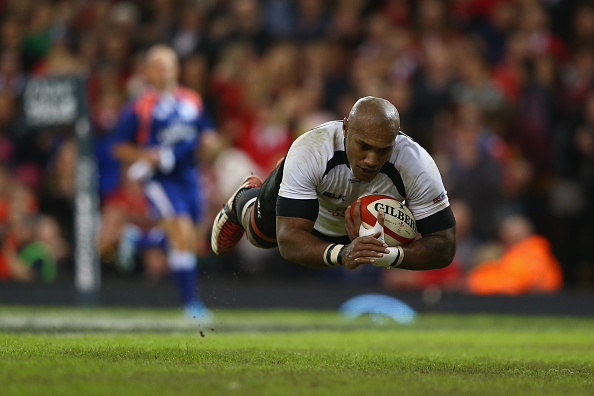A win's a win, but Wales' performance stuttered - in the second half especially. Here we analyse what went right and what went wrong for Warren Gatland's team...
When offloads go wrong
Wales may have beaten Fiji 17-13 but it was as error strewn a performance as you are likely to see from a tier one nation – without actually losing the game. It was clear from the whistle that Wales would continue the expansive game that they had started against the Wallabies seven days earlier. Early on, it worked. Wales ran some well executed patterns and scored two tries in 16 minutes. The first was created by a simple Rhys Priestland ‘pivot’ in midfield, and the second by a switch to the blindside which allowed Alex Cuthbert to stroll into the corner. However, whilst the admirable desire to pass the ball continued, the quality of execution didn’t. In total, Wales offloaded the ball 20 times – that’s twice as much as either France or Australia, five times the number attempted by South Africa and a staggering ten times more than England. The problem is that Wales’ desire to keep the ball alive often meant that the ball, when carried into contact, was held away from the safety of the ball carriers’ chest. Combine that with Fiji’s penchant for chest-high tackling and turnovers were highly likely. Wales coughed up 20 turnovers in total – that’s more turnovers than the head pancake chef performed at Pancake World, during Pancake Week, on Pancake Day, during happy hour. I dread to think what will happen if they turn the ball over 20 times against New Zealand….
Liam Williams on fire
Liam Williams was tremendous against Fiji and was Wales’ best player by some distance. He carried the ball an incredible 207 metres, which is a remarkable number in Test rugby. He also beat 11 defenders, a figure not often reached by an entire team let alone an individual. Despite his reputation for having a hot head his skills were ice cold. His passing, kicking and collection of high balls were very accurate and surpassed that of any of his peers on the day. His performance on Saturday will come as no surprise to those who have seen him playing regional rugby this season and in particular his desire to hit the outside channels at full pace. Whether it is on the wing or in his preferred full back position Williams offers Warren Gatland something that few others currently do. He has to start.
I've had prostate exams more enjoyable than that. #WALvFIJ
— Dai Lama (@WelshDalaiLama) November 15, 2014
Wins a win….#WALvFIJ
— Martyn Williams (@martynewilliams) November 15, 2014
Hat tip for Fiji
You have to admire the Fijian performance against Wales. Leaving aside the disparity in funding and infrastructure which creates a huge disadvantage from the outset, Fiji had no right to be within four points of Wales. Yes, this is a team which featured Nemani Nadolo Nasiganiyavi, Vereniki Goneva Metuisela Talebula Maijaina, but all of them were playing out of their favoured club positions. The Ospreys’ Josh Matavesi was playing at standoff instead of his more familiar role at 12. Fiji didn’t even have a recognised goal kicker – Nadolo may have had a higher kicking completion than Wales, on Saturday, but over his career he has scored more tries than either penalties or conversions for Fiji. And let’s not forget they were a man down for 28 minutes. Bravo Fiji.
Wales concede against 14 men
There were many areas of the Welsh performance over which Warren Gatland and his staff will pour, but the most worrying of all was that 15-man Wales couldn’t score a point when they had a one man advantage over Fiji for 28 minutes. Even though current thinking largely disproves the theory that teams generally concede up to seven points when they receive a yellow card – the current figure is nearer 2.5 points – those teams with a one man advantage certainly should not be conceding points. Wales actually conceded seven points during the period in which they had a one man advantage. If they struggled against 14 Fijians – they’re going to have a massive shock when 15 first choice All Black’s rock up at the Millennium Stadium next week.
I really hope the rest of the welsh team have bought @SanjayWills a pint for today! #WALvFIJ
— Chris Bromfield (@ChrisBromfield) November 15, 2014
@BBCScrumV just wanted to say that I thought referee Pascal Gauzere was outstanding yesterday, made all the right decisions #WALVFIJ
— Andy Neilson (@AndyNeilson07) November 16, 2014
Consistency is crippling Wales.
The lack of consistency illustrated by Wales against Fiji highlights the huge gap that exists between Wales and the All Blacks, Australia and South Africa. Yes, Wales broadly have players of equal quality as the big three, particularly Australia and South Africa, and their fitness levels are up there with the best. All of which mean that Wales are able to be largely competitive with the ‘Top 3’. However, the major difference is that Wales aren’t able to maintain a consistency in their performance. In seven days, the Welsh squad has gone from almost beating Australia to almost losing to Fiji – Australia are ranked third and Fiji are ranked 12th (correct as of 10 November). The Welsh backline almost doubled their turnover rate in just seven days and the teams’ overall tackle completion dropped to 85% – way below the norm for Wales. Can you imagine Australia, South Africa, or the All Blacks having such a performance dip over a seven day period? It’s a genuine problem and one which, until it’s resolved, will mean that Wales may always languish at the bottom end of the tier one nations.
Watch highlights from the match below







